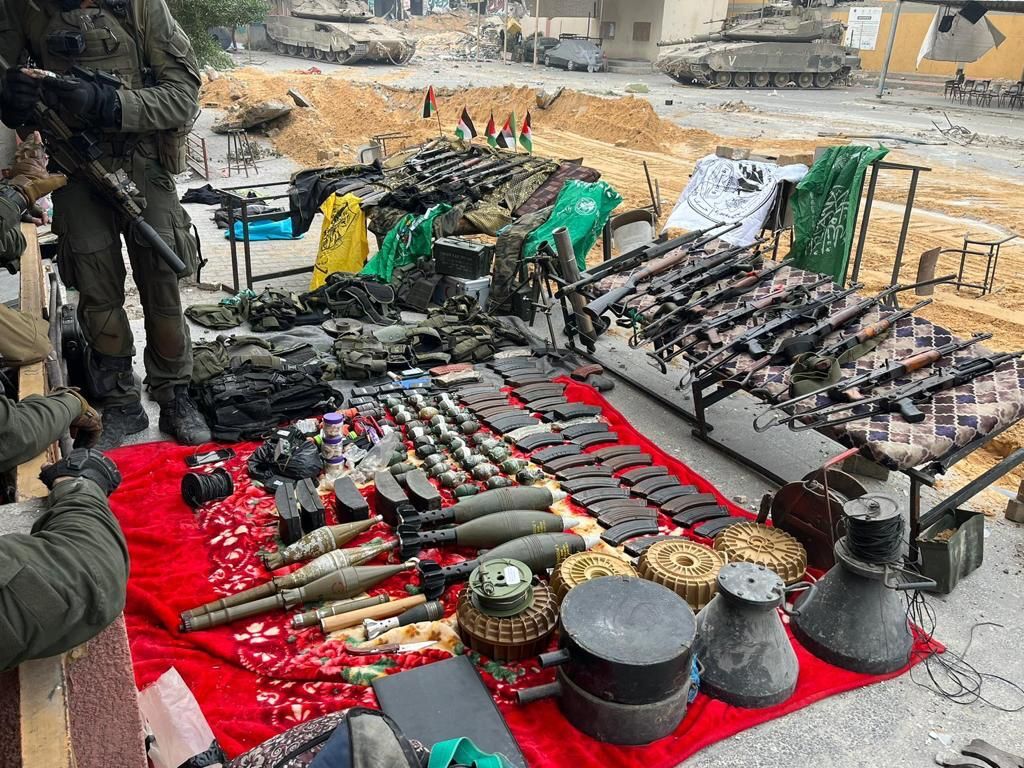
Hamas weapons discovered by IDF troops in a school in Gaza City’s Sheikh Radwan neighborhood, December 24, 2023. (Israel Defense Forces)
Prof. Sam Lehman-Wilzig: Arab Extremist Peacebreaking Since Nov. 29, 1947
Exactly 77 years ago this past Friday, the U.N. passed the Partition Plan for dividing the British Mandate into two countries – Israel and Palestine. The soon-to-be Israel reluctantly accepted the plan, despite its narrow borders. The Palestinian leadership, along with the entire Arab world, rejected the plan. Five months later, several Arab countries attacked the nascent State of Israel.
Why recount such “ancient history”? Because it set the pattern for major peace plan efforts undertaken in the ensuing seventy-six years. Every time a peace plan (or treaty) was in the works (or signed), extremist Arab actors made significant – and usually successful – attempts to stop or undermine the achievement.
Before relating these cases, it must be said that such efforts were directed not only at Israel but also toward the extremists’ Arab brethren who “dared” sue for peace or friendly, agreed-upon relations. Thus, the following litany of attacks is not to be viewed as a generalization regarding the Arab world writ large, but rather is a sign of a deep split within the Arab world as to what to do about, or with, Israel. Precisely because several peace-seeking Arab states are ready to have peaceful relations with Israel, the violent pushback becomes that more virulent by the rejectionists (including one Jewish extremist example).
After 1947, the next case attempting to stop a peace process involved the first-time treaty signed in 1979 between Israel and an Arab country: Egypt. What occurred two years later shocked the world: Egypt’s peacemaking leader Anwar Sadat was assassinated for daring to make peace with the “Zionist entity.” In this case, the impact was minimal: the peace treaty held under Sadat’s heir, Hosni Mubarak, and continues to hold until this very day.
The next step along the peace path was no less full of violence. The 1st Oslo Accord between Israel and the Palestinians was signed in 1993, followed in 1995 by the 2nd Oslo Accord, trying to cement the peace process that was supposed to ultimately lead to a Palestinian state. However, this time the violent reaction came from the Israeli side: Prime Minister Rabin’s assassination by a Jewish extremist just a few weeks after Oslo 2 was signed. In the ensuing elections, right-wing Netanyahu (who had earlier campaigned against the Accords by vilifying PM Rabin) came to power, thereby stopping the peace process in its tracks.
After he lost the ensuing election to former IDF Chief of Staff Ehud Barak, the peace process was resuscitated, leading to the Camp David negotiations under the aegis of U.S. President Bill Clinton. This time, however, the extremist was one of the negotiation parties: Arafat turned down a very attractive package that Barak was willing to offer, but the PLA leader said nyet (Clinton subsequently blamed Arafat for the negotiations’ collapse). As if to add an exclamation point to his rejection, the Palestinians a bit later started (what came to be called) the Second Intifada, a five-year battle against the State of Israel.
The recent, ongoing, Oct. 7 (2023) war in Gaza, therefore, is but the latest example in which extremists resorted to desperate violence to undercut a peace process. In this case it was the warming relations between Israel and Saudi Arabia, with a few other Arab states waiting in the wings should the Saudis give them the peace sign. Documents discovered by the IDF in Gaza detailing Hamas’ attack plans also found its leadership bemoaning the improvement in relations between Israel and the Arab Gulf states. To paraphrase the document: it would clearly enable Arab and Islamic countries [Indonesia, Malaysia, etc.] to move in the same direction, greatly complicating the resistance project. When was this document written? Just a few days before the Oct. 7th attack!!
What about this week’s agreement between Hezbollah and Israel? It certainly is not a peace treaty but rather a modus vivendi for the (temporary) cessation of hostilities. But over the long term, here too the same general scenario is playing out. Left to its own devices, Lebanon would probably have signed a peace treaty with Israel long ago. Unfortunately, the very large Shiite population (30-40% of the country) underpins the extremist anti-peace party within the body politic: Hezbollah. It too has resorted in the past to domestic assassination, the most egregious case being former PM Rafiq al-Hariri who tried to remove from Lebanon the Syrian troops allied with Hezbollah (that backfired: the country was so upset by Hariri’s assassination that the Syrians were forced to leave). Were Hezbollah to also be somehow neutralized from the Lebanese equation (a long shot, despite the latest agreement), real peace with Israel would probably be on the table relatively quickly.
Everyone realizes that making peace is a complex process, but in the Middle East, it is also a very dangerous one for at least one side that’s moving in a peaceful direction. Extremist enemies of peace who will stop at nothing to stop the process lie in wait from without (1947 Arab countries; 2023 Hamas) and also from within (Egypt 1981, Israel 1995). This in addition to others within both camps who won’t resort to ultimate violence but will try their best through political means to sabotage or halt any progress in the direction of peace (Hezbollah in Lebanon; extreme right-wing parties in Israel). In short, if you’re wondering why eight decades later the Arab-Israeli conflict – or if you wish, the Palestinian-Israeli struggle – hasn’t been resolved, add the factor of personal danger to the leader and/or to society from extremists, anti-peace ferocity. If extremists excel at anything it’s their indomitable will to leave peace in pieces.








